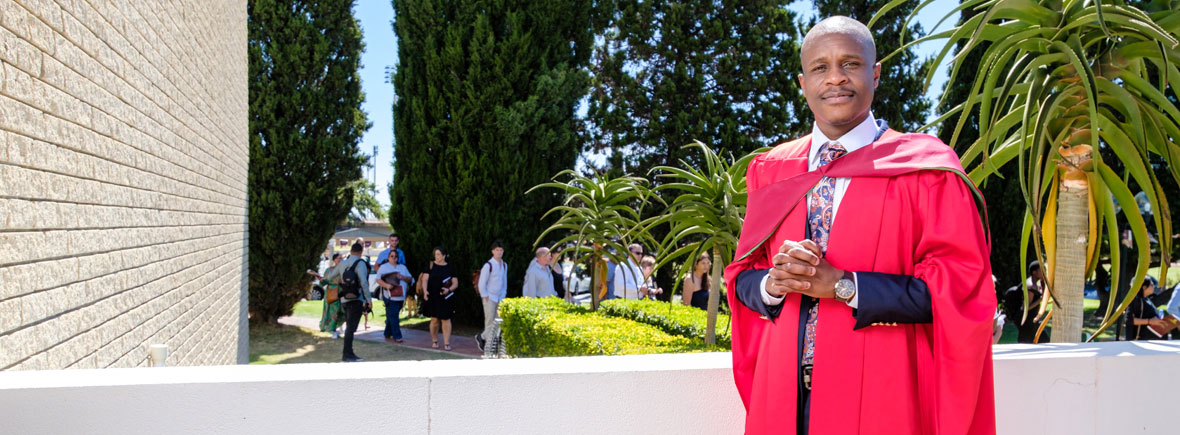An idea that could eventually help shrink the pomegranate industry’s plastics footprint and can curb food losses along its value chain. That’s what a newly graduated PhD student in Horticultural Sciences at Stellenbosch University (SU), Dr Tatenda Kawhena, came up with when he developed an edible coating that extends the storage and shelf life of this Mediterranean fruit.
The coating includes ingredients such as gum Arabic, maize starch, lemongrass essential oil, glycerol and an emulsifier. Gum Arabic, a natural gum, consists of the hardened sap of two species of Acacia tree, Senegalia senegal and Vachellia seyal, which are not indigenous to South Africa.
Through laboratory-based studies, Dr Kawhena showed proof of concept that dipping ‘Wonderful’ pomegranates into the solution he developed works well to extend the storage and shelf life of the fruit. Furthermore, the fruits last even longer when they are first dipped into the coating solution, and then packaged in plastic polyliners and standard open cartons.
A next step would be to test it within the context of a packhouse.
Dr Kawhena started his PhD studies with the grand vision of helping to reduce waste and minimise food loss within the pomegranate industry.
There has been a rapid rise in pomegranate production in South Africa to meet global demand. However, pomegranate fruit is highly susceptible to postharvest losses and waste, which limits the growth of the local industry.
“Great care must be taken to ensure that pomegranates last as long as possible, and do not go to waste once they have been picked. They are easily damaged along the postharvest logistics chain,” explains Dr Kawhena. “Therefore, the development and application of new science-based technologies to reduce postharvest losses in pomegranate fruit is a priority.
“Currently, as part of efforts to make pomegranates being exported last longer, around ten fruit are packed together into a plastic bag, and then further into cartons.. Within one fruit season, that all adds up to a lot of plastic, which is often only used once.”
His PhD studies were funded by the Pomegranate Producers’ Association of South Africa (POMESA) and the DSI-NRF South African Research Chairs Initiative (SARChI) in Postharvest Technology at SU. Some of his results have already been published in peer-reviewed scientific journals.
Path towards a PhD
“With a PhD, you start in the wild and then you find your way through,” Dr Kawhena summarises the many months of experimentation that went into finding the right combination of ingredients for his edible pomegranate coating.
He learnt a lot of resilience while pursuing this phase of his research, as it coincided with the hard lockdown COVID-19 months in South Africa, in 2020 and 2021. The SU campus was lonely because only a few students were allowed to pursue their laboratory-based studies.
“And I had to work with a mask, which is not something that an agricultural researcher is used to,” he remembers.
His studies were supervised by Prof Umezuruike Linus Opara, an agricultural engineer who Dr Kawhena holds in high regard, and Prof Olaniyi Fawole of the University of Johannesburg. Prof Opara is the South African Research Chair (SARChI) in Postharvest Technology, a distinguished professor in the SU Department of Horticultural Science, and a world leader in postharvest care of pomegranates.
Dr Kawhena hails from Marondera in Zimbabwe, and matriculated in 2009. He began his life in the agricultural sector by studying crop and soil science as an undergraduate at the University of Fort Hare in South Africa. In 2018 he completed an MSc in Horticultural Science at Stellenbosch University, already under guidance of Prof Opara. During this period, he studied how to control superficial scald on ‘Granny Smith’ apples and ‘Packham’s Triumph’ pears using a non-chemical cold storage technique called Dynamic Controlled Atmosphere (DCA).
He is now pursuing a career in the South African horticultural sector, as a Project Manager for Provar, a company based in Paarl focusing on the independent evaluation of new fruit cultivars and rootstocks, and a data centre for the latest product development intelligence.

